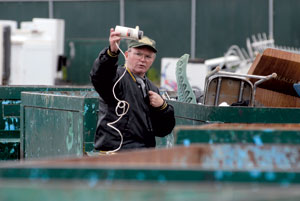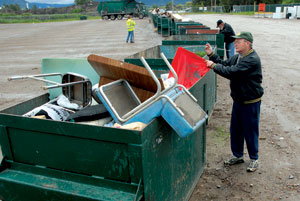COLUMBIA FALLS – It’s about 2 p.m. on a Wednesday, and with the trash bins at the county green box container site recently emptied, Gerald Mongan sits on the tailgate of his old truck, waiting.
A garbage picker on and off for about 20 years and a veteran of the Marine Corps, his plaid flannel shirt is tucked into his jeans and he wears a beard, a black hat with gold trimming and a pair of hard-worked tan boots. The boots have padding in them, he says, because diabetes causes him aches and pains.
Mongan, known as Gerry to most at the site, waits until a couple of trucks and a van come through the site before he begins searching the trash for potential treasure.
Armed with a metal-hooked wooden stick, work gloves and a sense of humor, Mongan is holding two empty beer cans and a license plate when he takes a break to chat, the intermittent wind raising a sour smell from the containers.
He’s got some opinions about the Flathead County Solid Waste Board’s decision to prohibit scavenging at the Columbia Falls container site, effective on July 1. The new rule applies to the county’s landfill as well.
“The way things are right now, the economy, I can’t see why they’re shutting it down,” Mongan said.
The driving forces behind the change are safety and health, according to Flathead County Public Works Director David Prunty. He said he’s seen people going through the containers without gloves, and people inside the bins without protective gear.
There are biohazards, such as used needles, in there that can cause significant harm, he noted.
“I have seen kids, whether their parents are with them or not with them, inside the cans jumping around in tennis shoes,” Prunty said.
Other folks root around in the cans for food. While he said he realizes times are tough, Prunty said pulling food from a garbage can is a bad idea.
“People think that these people need to do this because we’re in a recession,” Prunty said. “Don’t get me wrong, I feel for those folks, but digging through the garbage can to get food is not something that the district or I want to promote.”
Identity theft is another reason the county is shutting down scavenging, Prunty said.
It will not be an easy adjustment; scavenging has been part of the culture here for at least 30 years. But Flathead County is anomalous in that regard, Prunty said, and the new policy will bring it more in line with other counties.
“In my opinion, and now with the agreement with the board and the (county) commission, we’ve just seen this grow to such a big thing that there’s just too much liability for us to turn a blind eye to it,” Prunty said.
 |
|
Bob Thompson alerts fellow picker Gerald Thompson to an electrical chord that can be cut away from its device while browsing the green box container site in Columbia Falls. Pickers can get a dollar a pound at recycling sites for the electrical wire. |
The new rule applies to the county landfill as well, and it is largely aimed at prohibiting employees from scavenging. It’s leading by example, Prunty said.
The plan is to eventually ban scavenging at all green box locations, once the county is able to hire more personnel.
Prunty also said there is a potential plan to set up a drop-off center for Habitat for Humanity near the landfill, so usable items – mostly building materials – can be recycled instead of thrown away.
“We’re entertaining the thought that they might be interested in that,” he said.
*********
At the Columbia Falls site, county employee Rita Blair is getting ready to take some heat from the public for the board’s decision. She’s been out there since last August as part of a grant the county received for a compactor. She runs the compactor, cleans up the site and administers the rules.
On July 1, that will mean enforcing a new policy that is already unpopular with people at the site.
“It’s going to be bad,” Blair said.
She knows most of the regular pickers by name; some of them spend eight to nine hours a day going through containers. Most days are uneventful, she said, but others can get out of hand.
“It’s been pretty gnarly, people getting into fights over garbage,” Blair said. “Most of them are OK, but you always have your bad apples.”
Mongan agrees with her general assessment of personalities, though he said he’s never seen an actual fight over a good find. It’s more like an argument between cousins, he said.
Blair said she’s heard opinions both for and against prohibiting scavenging from people visiting the site, but most dislike the new rule. One garbage-picking proponent, apparently mistaking a reporter for a county employee, gave his colorful opinion about the new policy.
Sprinkling in several obscenities for emphasis, he said it would harm the people who rely on garbage finds to survive.
Once the man drove off, Mongan immediately apologized for the truck driver’s language, but added that he personally doesn’t think the new rule is fair, and suspects it has more to do with money than safety.
“It’s just the county seems to want more, because they’re broke,” he said. “They think that we’re stealing their revenue.”
Picking has become a hobby for Mongan, and he says he goes through the bins looking mainly for aluminum and any sort of wire – especially copper – for recycling.
In earlier days, he was making $250 a week doing garbage picking from morning until night, he said. It fluctuates with recycling prices. The money he makes goes toward gas or sometimes just to make ends meet.
He’s heard all sorts of opinions about the garbage pickers in his time there, including one man who flat out said he didn’t like “you trash people.”
But it’s not always like that.
“There’s some nice people out here,” Mongan said, remembering the times when local residents brought him bags of dry goods.
He shares that bounty, and most of the canned food he finds, with families he knows need it. Mongan, a former carpenter, also finds items to fix up and sell later.
 |
|
Bob Thompson, front right, pulls a practically brand new short-sleeved shirt from a dumpster while fellow picker Gerald Thompson, back right, sift through the contents of the green box container site in Columbia Falls. |
Bob Thompson, another veteran garbage picker, does much of the same.
“I’m retired and I go down there and I pick up things that are salvageable and I take them home and I repair them,” Thompson said. “I give them to people, I don’t sell nothing.”
Clothing goes to local second-hand stores, boxes of canned food go to families in need and toys he fixes go to kids at the National Guard’s annual Christmas dinner celebration, Thompson said.
“You can’t believe some of the stuff that people throw away,” Thompson said. “It’s a real shame that they throw it away because there’s a lot of people that can use it. Several people that go down there, that’s their food. That’s how they’re making a living.”
*******
Mongan’s wife doesn’t necessarily approve of his method of earning extra spending money – “she never has,” he says, laughing – but he’s found some treasures out here, including two Black Hills gold rings he cleaned and gave to her.
At a different container site, he found a shotgun that a woman threw out when her husband died.
He said he turned it in to authorities and eventually got it back. It’s imperative to turn weapons in, Mongan said, because you never know what they were last used for. Pistols occasionally turn up at the Columbia Falls site, Blair noted.
There are several rules among the pickers that help maintain order, Mongan said. For instance, whoever gets to a can first gets the initial pick through. Squabbles can erupt, he said, but pickers can always opt to share.
Not everyone who searches the trash can be trusted, Mongan conceded. Blair said she has seen people ripping open garbage bags and going through old mail or finding birth certificates and old checkbooks. Others can cause disruptions or make trouble for everyone else, Mongan said.
For the dedicated pickers at this site, of which Mongan says there are four or five but Blair estimates triple that number, the July 1 scavenging shutdown will force them to go elsewhere or find other ways to make ends meet.
“Some of the people don’t know anything else,” Mongan said. “They don’t want to go back and read; to school. They want to go on with their life and do what they want to do.”
As for Mongan, he’s battling cancer and diabetes and doesn’t expect to move on with the crowd. His first full-benefits disability check will arrive in July, and other benefits kick in after he turns 65 in August. Veterans Affairs provides his footwear, as well as his glasses and hearing aids.
On July 1, he expects to trade his hooked picking stick for a different type of hook.
“I like to fish,” Mongan says, laughing once again.